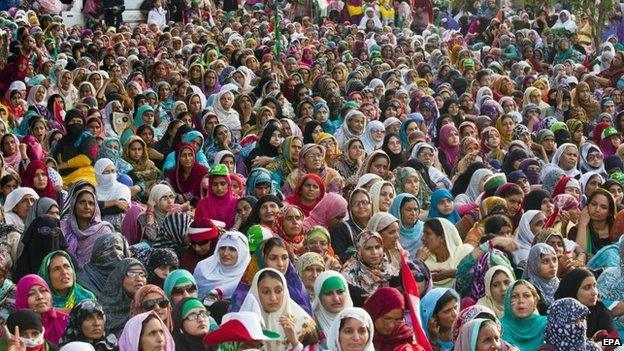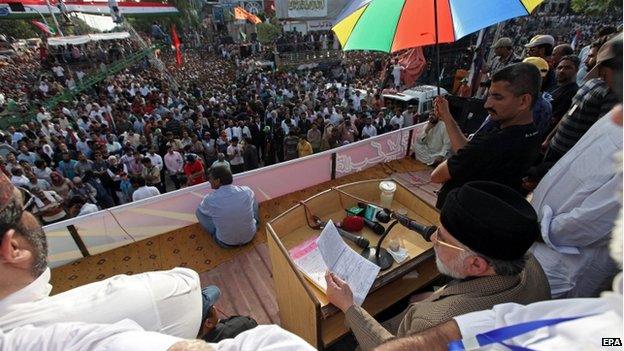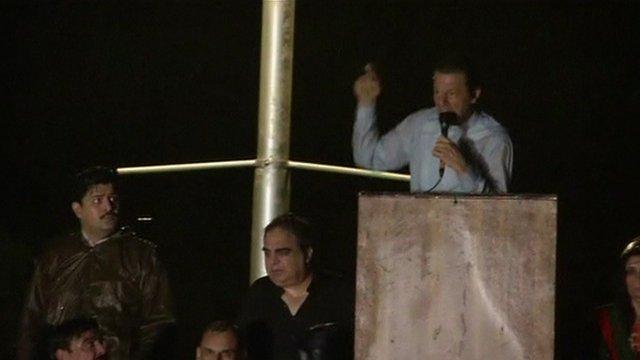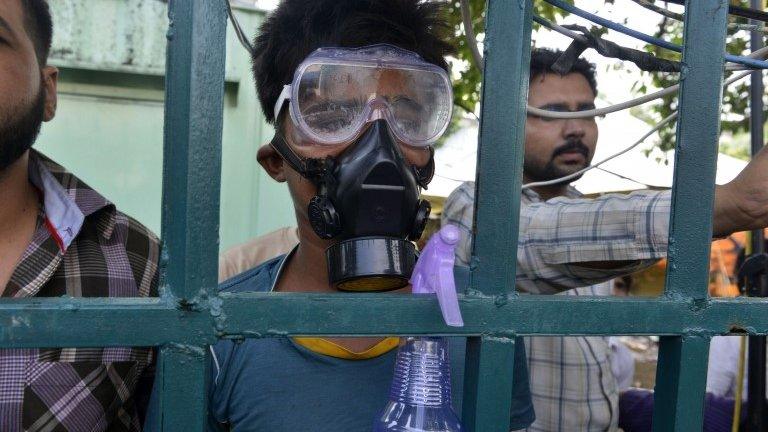Pakistan protest cleric Tahirul Qadri rejects army links
- Published
Dr Tahirul Qadri says Pakistan needs a "true democracy"
The Pakistani cleric leading thousands of protesters occupying parts of the capital Islamabad has firmly rejected allegations he is linked with the army.
Tahirul Qadri told the BBC he has never been in contact with the military.
Mr Qadri has been seen as close to the army, with this protest fuelling fears of an army intervention in a country with a history of military coups.
Along with opposition politician Imran Khan, he has called for Pakistan's Prime Minister Nawaz Sharif to resign.
Both men led thousands of their supporters in separate marches from Lahore to Islamabad and both protest camps are now occupying two highways in the Pakistani capital.
The government has accused the protesters of trying to derail democracy, just over a year after polls that ensured Pakistan's first peaceful transfer of power between civilian governments - polls the protesters allege were marred by fraud.
The Pakistani prime minister offered to set up a high level judicial panel to look into the allegations, but the offer was rejected.
'No theocracy, no martial law'
Mr Qadri has lodged himself in a small, air conditioned, bombproof shipping container. The container is placed on one of Islamabad's main roads, which has effectively been taken over by thousands of his supporters.
The crowds - among them a large number of women - have been camping there, despite the monsoon heat and sometimes rain.

Supporters of Tahirul Qadri remained camped out for a third day in Islamabad

Mr Qadri has been making speeches to his amassed followers
Imran Khan and Tahirul Qadri vowed to together bring one million followers on to the streets of the city. But in the end, the numbers fell far short of their expectations.
The firebrand cleric, who commands loyal supporter from many thousands of Pakistani youth, denied accusations of links with the army.
Pakistan's main intelligence agency, the ISI, has a track record of destabilising civilian governments and instigating an internal crisis when none previously existed.
"I have never been in contact with the military establishment, and I have never met the ISI chief or any army general, I have never spoken to any one of them on telephone in my entire life," he told the BBC.
Dr Qadri insists he is fighting for true democracy, one that is responsive, accountable and transparent.
"We want democracy in such a way, in manifestation, as we see in America, UK, Canada, EU. Why don't people have the right to see the same culture, norms and values of democratic system as the people of Western world are enjoying?" he said.

Imran Khan (L) and Tahirul Qadri (R) are threatening to mobilise angry supporters on Thursday
He rejects last year's national polls, in which Nawaz Sharif won a landslide, as a sham election. He wants the government to resign and the dissolution of the parliament.
"We want a national government which will hold corrupt politicians accountable for their loot and plunder of this country," he said.
But he is at pains to emphasise his democratic credentials and stressed that he would be the first person to oppose any imposition of martial law.
"I don't believe in theocracy, I don't believe in any kind of dictatorship," he said.
The sit-in has continued since the weekend. In the absence of a negotiated settlement, it's likely to drag on for now.
The real test of the protesters and their leadership lies in the days ahead.
- Published16 August 2014

- Published13 August 2014
